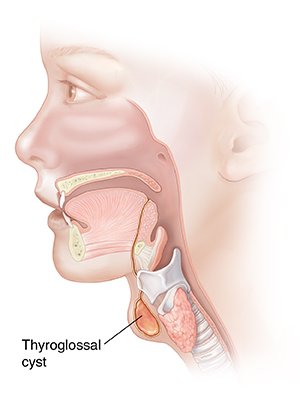Understanding Thyroglossal Cysts
A thyroglossal cyst is a type of neck lump (mass) that some people are born with. Thyroglossal cysts are most often found and treated in children. But they may sometimes go undetected or untreated until adulthood. In most cases, thyroglossal cysts are benign. This means they are not cancer.

What causes a thyroglossal cyst?
The thyroid gland is a butterfly-shaped gland in the lower front of your neck. During fetal development, thyroid cells have to move down a passage called the thyroglossal duct before reaching their final location in the neck. This duct should go away before birth. If the duct remains, it can fill with fluid and mucus. This is called a thyroglossal cyst.
Symptoms of a thyroglossal cyst
A thyroglossal cyst may cause a round lump in your neck that can be seen, felt, or both. It can be as small as an inch or less (1 to 2 cm) to as large as 3.9 inches (10 cm). It may move when you swallow or stick your tongue out. If the cyst becomes infected, it may cause redness, swelling, pain, tenderness, or drainage. In some cases, a cyst may cause problems breathing or swallowing.
Treatment for a thyroglossal cyst
-
A thyroglossal cyst is most often treated with surgery. If the cyst is infected, you will need to take antibiotics first to clear the infection. During surgery, the surgeon removes the cyst. They also remove any remaining parts of the thyroglossal duct. The surgeon also removes part of the hyoid bone. This small bone is located in the neck near the thyroid. If present, any sinus tracts are removed. These are abnormal pathways that connect the cyst to the surface of the skin. The surgeon may also remove abnormal thyroid tissue.
-
If the cyst cannot be removed with surgery, you may have ethanol sclerotherapy done. During this treatment, the healthcare provider injects alcohol into the cyst.
Possible complications of a thyroglossal cyst
A cyst may get larger. It may also become infected and cause symptoms. In rare cases, a cyst may contain cancer cells.
When to call your healthcare provider
Call your healthcare provider right away if you have any of these:
-
Fever of 100.4°F (38°C) or higher, or as directed by your healthcare provider
-
Increased pain, redness, warmth, swelling, or drainage at any incision or injection sites, if treatment was done
-
New symptoms
-
Symptoms continue or get worse even after treatment